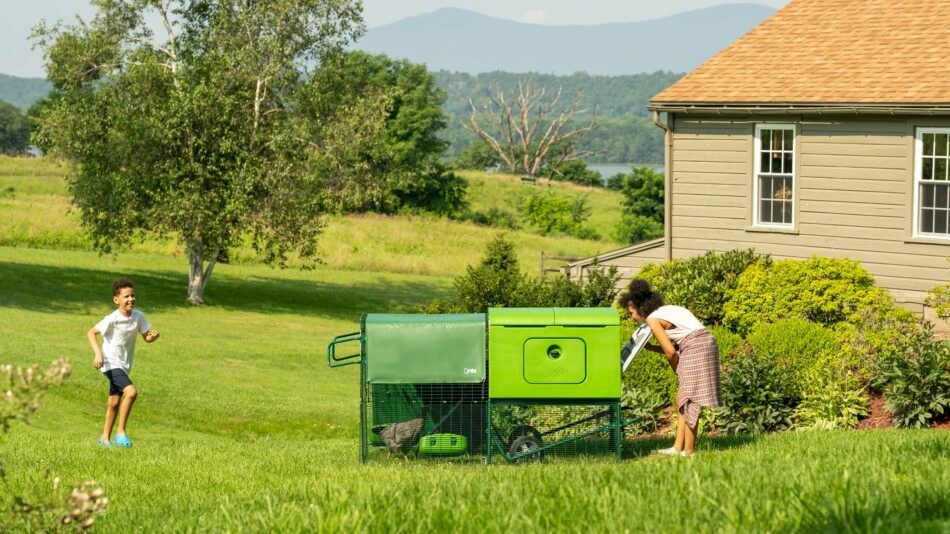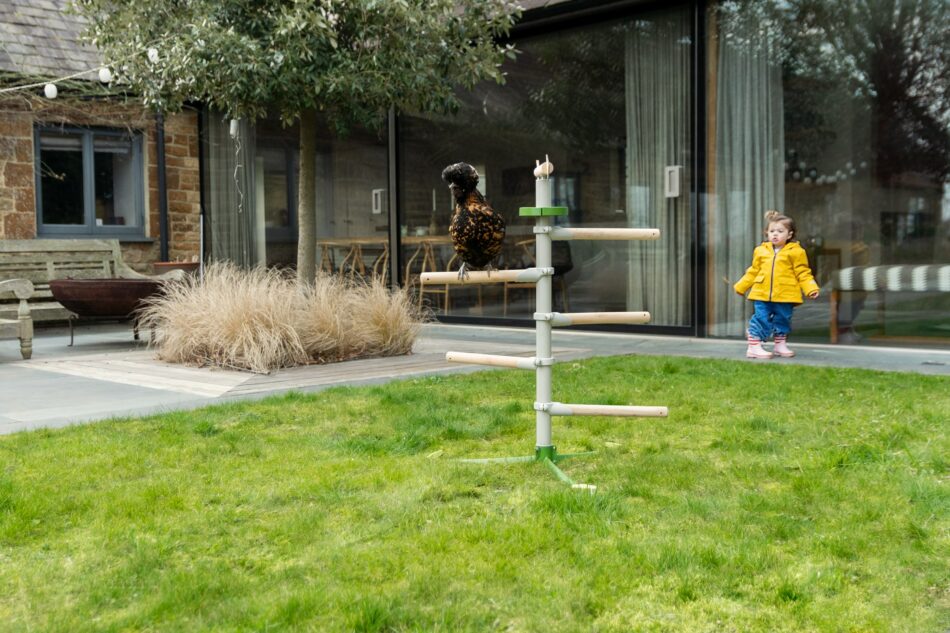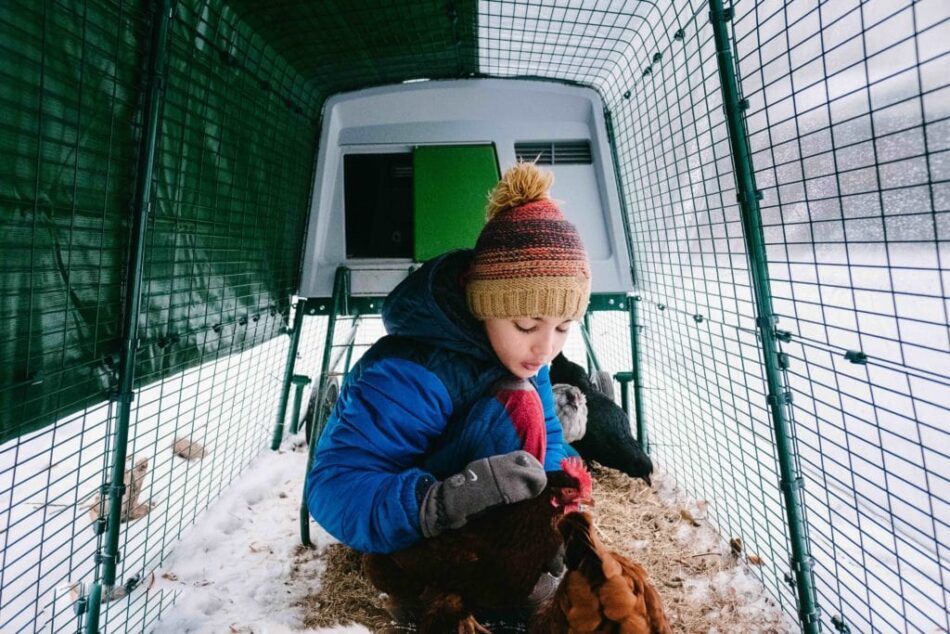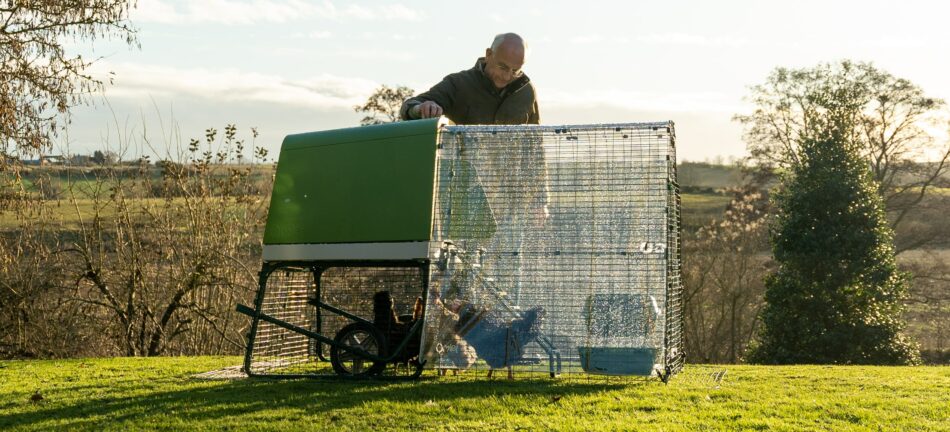Overcoming chicken-keeping challenges in the year ahead
Hens spend their entire lives outdoors. This means they have to cope with everything the year throws at them — from summer heat waves and winter chills, to year-round downpours. Being hardy birds, they take much of this in stride, but they benefit from a helping hand from their humans. Here are ways to help your flock and prepare for the chicken-keeping challenges in the year ahead.
Summer
It’s amazing to see the transformation in your chickens as the seasons change. Gone are the downy, fluffy winter and early spring jackets your hens sported mere months ago. Instead, you may now notice your hens’ feathers slowly becoming more dull, and they are spending more and more time under shaded areas.
For many flock-raisers, summer poses the largest threat to chickens. The main risks that flocks face in the summer months are heat and too much sunlight. Be sure to have plenty of shaded areas where your chickens frequent, and keep fresh, cool water available at all times. A chicken coop that provides shade itself, like the space under the Eglu Cube or the Eglu Go Up, is ideal for the summer months.
The Eglu Cube chicken coop is designed to reduce moisture and increase airflow through its ingenious ventilation design. Twin-wall insulation and vents along the back allow for cool air to circulate while keeping the warm air out. Plastic doesn’t hold onto moisture the way that wood does, so your chickens can find relief from the damp, humid air. The Eglu Cube also offers a shaded area beneath the coop, with the option to add heavy-duty run covers to the sides and top of the run for additional protection from the sun. And, with added handles and wheels, the Eglu Cube can be moved to shadier, cooler spots as summer progresses.
Here are some other methods to alleviate heat-related stress in your flock during the summer months:
- Keep the water supply full, as hens drink more in warm weather. Add ice cubes to waterers if possible throughout the day to keep the water temperature at a refreshing level.
- Provide a dust bath – either a dry area of ground in the garden, or in a container in the chicken run. Cat litter trays, kiddie pools, and even old tires with the rims removed make great basins for dust baths.
- Offer treats like frozen corn or other chicken-safe veggies in a chicken treat dispenser or chicken peck toy.
- Look for any signs of heat stress in your hens. Open-mouth breathing (panting), lethargy, agitation, increased saliva production, or any other concerning symptoms should be reported to your veterinarian. Bring any chicken exhibiting heat stress into an air-conditioned space, but refrain from employing any other cooling measures until hearing from your veterinarian. It can be dangerous for an overheated chicken to have their body temperature brought down too quickly.
Fortunately, the “dog days of summer” usually yield to lower temperatures at night. You may want to offer more space outside of the coop for your chickens to roost overnight in the warmer months, as they will need extra space away from each other’s body heat during this season. A Freestanding Chicken Perch or PoleTree will give your hens aerial space to roost if they need to spread out at night. Just be sure that all of their enclosures are predator-resistant.
Autumn
Autumn is a favourite season for both flocks and their keepers. Bugs are still abundant, the temperatures are comfortable, and gardens offer hen-friendly snacking opportunities when gardeners rotate crops.
Hens will often moult this time of year in preparation for colder temperatures, so they need a good diet to help them stay healthy and grow new feathers. Extra vitamins and minerals will boost feather growth, and a little apple cider vinegar in their water will help them grow healthy and glossy plumage. Egg production will cease or drastically reduce while hens are moulting, but once they’ve completed their transformation, your hens will resume their laying schedule. The shorter days will prompt chickens to lay less frequently, but good layers will continue to produce eggs during the fall and winter.
Winter
Depending on your location, winter can be one of the most challenging seasons for all outdoor animals. No matter where you live, there’s a lot working against both humans and chickens when cold weather sets in – but thankfully chickens are naturally equipped to endure lower temperatures. Because of this, chicken-keeping in the winter isn’t much different from the rest of the year, but a few preparations can go a long way in helping your hens thrive in the cold.
Cold-weather chicken considerations
- Although chickens cope well with the cold, they’ll need some help when it’s both cold and wet. Keeping hens in an insulated Eglu Chicken Coop is a good place to start, with the option to add extra chicken coop weather protection to both the run and the coop. This is especially helpful if you live in an area that receives heavy snowfall.
- Perches in the run enable chickens to cuddle up when it’s cold – which is essential in the winter months. The Omlet Chicken Perch, being composed of eucalyptus, a strong, untreated wood, prevents chickens’ feet from becoming too cold. Offering perches above the frozen ground of the run gives your hens’ toes a break from the chill.
- In sustained sub-zero temperatures, rubbing Vaseline on your hens’ combs and wattles will help prevent them from becoming frostbitten.
- Keep your hens’ feet dry in wet weather by lining the run with wood chippings, straw, or hay.
Winter daylight hours
- Chickens usually return to the coop to roost at dusk. But in the winter, you may find your birds trying to get more time outside on the short days. If your hens are prone to wandering around in the dark, a high visibility hen coat will help you locate them – and also ensure they’re visible to anyone else, should they stray from your garden.
- Installing an automatic chicken coop door with a coop light will help your hens adhere to bedtime. The door can open and close automatically based on the amount of daylight, a specified time, or manually. The coop light will help beckon wandering birds to bed when darkness falls, as chickens will naturally gravitate toward a light source.
Your chickens’ health during colder months
Keep an eye out for coughing, sneezing, lethargy, or other signs of chicken illness. Older or weaker chickens can become more vulnerable to illness when the cold weather sets in.
- Egg production will decrease – but this doesn’t mean no eggs for breakfast. While your hens may not lay as frequently, and some may stop altogether throughout the colder months, a flock of 4 or more chickens should still provide an adequate supply of eggs for your family during the winter.
- Make sure your hens’ diet consists of high-quality feed and scratch, and consider adding some extra chicken vitamins and minerals to boost their immune systems. Offer hay or greens in a chicken treat holder to provide a nutritional activity on cold days.
- Their water will freeze, so be prepared to break the ice, and have some spare water dispensers ready in case the waterers freeze solid. Pour hot water over any icy water sources throughout the day to help keep things thawed. Consider placing submersible bird bath heaters in your chickens’ waterers to keep them thawed.
- On the upside, winter might kill off any lingering flies, mites, and other pests your chickens encounter during the warmer months.
Spring
As the days lengthen, your hens will start laying more eggs. Vegetation comes back to life, and chickens find insects, plants, and other findings worth scratching around for. Your chickens will likely be wanting to spend more time outside in the warmer temperatures and longer days, but predators also spend more waking hours roaming in the spring.
Protect your chickens from awakening predators
Predatory animals such as foxes, wolves, and badgers will also be on the prowl after a lean winter. Keeping your chickens in a secure, covered run is vitally important during early spring when nature’s predators are also taking advantage of the changing seasons. Automatic chicken coop doors will ensure the hens are in and out at the right times, and will prevent predators from gaining access after-hours. The door will also let your chickens out in the morning, so that you can enjoy weekend mornings in bed as the days get longer.
Take proactive steps to reduce chicken coop pests
It’s also important to note that mites and parasites make their debut in the spring, so if you don’t have an easy-to-clean plastic chicken coop, be sure to treat your coops and runs to get ahead of the pests. Mites thrive in wooden surfaces, so housing your hens in a plastic coop is a first line in defence to eliminate pests. Change bedding daily, and clean the interior of your coop frequently to keep your chickens healthy and happy when mites threaten to emerge.
Year-round chicken care with Omlet
At Omlet, we’re here to support chicken keepers all year round. By keeping your hens in an Eglu Chicken Coop and Walk In Chicken Run that are both easy to maintain and clean, you’ll create an environment that is enjoyable for both you and your flock no matter the season. These, along with Walk In Run Covers, make seasonal preparation quick and easy so that the changes in weather, amount of daylight, and looming predators don’t detract from the wondrous connection you’ve created with your chickens. So here’s to another year of chicken-keeping, the Omlet way.
This entry was posted in Chickens



